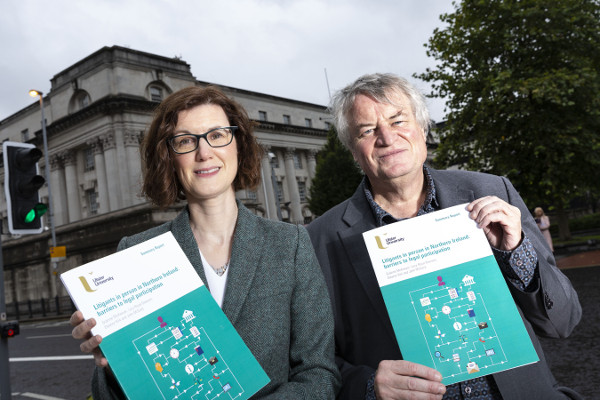NI: Right to fair trial ‘at risk’ when individuals appear in court without a lawyer

Pictured (l-r): Gráinne McKeever and Les Allamby
New research from Ulster University has found that an individual’s right to a fair trial can be in danger if they go to court without legal representation.
Gráine McKeever, professor of law and social justice at Ulster University, led the first study of its kind in association with the Northern Ireland Human Rights Commission (NIHRC) and with funding from the Nuffield Foundation.
Researchers explored the experience of those who take or defend civil and family law cases without legal representation, to understand the impact of self-litigation on the courts and on an individual’s human rights when litigating without representation by a legal professional.
The main reasons individuals chose to represent themselves were financial, especially for those who were not eligible for legal aid, and because the cost of legal representation was seen to be too high. Some individuals chose to represent themselves because of a negative experience of legal representation in the past or because they felt it was something they could do themselves.
Many litigants in person faced problems with completing and submitting the appropriate paperwork, as well as understanding the legal arguments in their case.
The research identified a significant lack of public information and advice on the practical, procedural and legal issues relating to court proceedings.
Ulster University researchers worked with the NIHRC to trial an innovative “procedural advice” clinic for individuals representing themselves in matrimonial or family law cases.
“Procedural advice” is neutral advice or information helps the person think through their options and decide for themselves the best approach to their case, as distinct from from legal advice which looks at the merits of the person’s case and suggests a legal strategy.
Professor McKeever said: “Although the help of the advice clinic was not enough to help litigants in person match the advantages of legal representation in most cases, there is clear evidence that improved access to legal services, better information on court procedures and relevant law, as well as guidance on how to complete court forms and documents would remove many of the barriers that threaten the right to a fair trial.”
NIHRC chief commissioner Les Allamby said: “Effective access to justice engages human rights. The research highlights the difficulties individuals face in trying to represent themselves in court. The recommendations provide a road map for lawyers, judges, administrators and personal litigants to tackle the issues identified.
“It is in all our interests to improve the experience for the thousands of people who have to represent themselves and to ensure justice is both done and seen to be done.”
Robert Street, director of justice at the Nuffield Foundation, added: “This research shows that people who represent themselves in court can be disadvantaged on a number of levels, and that has serious implications for their right to a fair hearing.
“The recommendations offer practical ways these barriers to effective participation can be addressed through improved access to services and information, as well as cultural and administrative changes in the courts. There are also lessons for England and Wales, where the number of litigants in person has been increasing since the changes in legal aid eligibility.”











